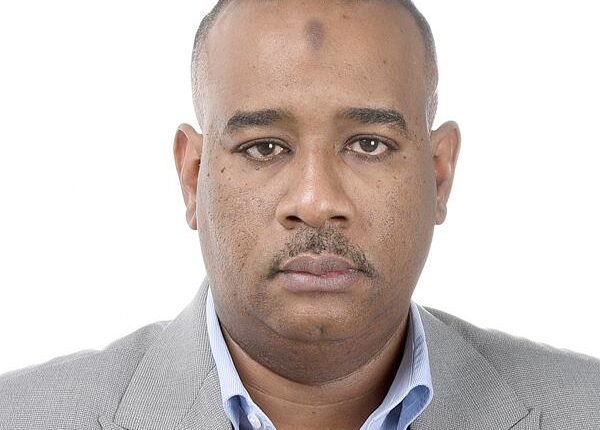Abdalla Hamdok… Was He Speaking in Broad Daylight or in the Darkness of Night?

By: Muhannad Awad Mahmoud
In a scene not lacking in astonishment, former Sudanese Prime Minister Abdalla Hamdok made statements that can only be described as a blatant mockery of Sudan and an irresponsible derision of an official position issued by the Sudanese Ministry of Foreign Affairs. The Ministry had declared that Sudan would build its relations with countries based on their stance toward the Rapid Support Forces (RSF) and the political groups allied with them—at a time when the nation is passing through the most delicate phase of its sovereign history.
Hamdok did not merely belittle the statement; he went further into what can only be described as delusional rambling, mocking Sudan’s relations with South Africa by saying:
“The people in Port Sudan are threatening South Africa?!”
As if he were speaking about a local club and not a sovereign nation with a proud history.
The pressing question is this:
Was this a daytime statement worth building a political position on, or a drunken ramble of the political nights Hamdok has become known for?
Was he in full possession of his faculties when he uttered such words?
Or is it as the poet once said:
“When the drunk speaks lies at night,
The sober morning erases what was claimed.”
This statement revealed the fragile connection between Hamdok and his homeland. Since leaving Sudan in the early 1990s, his intellectual, societal—even emotional—ties to it have been severed. Even the house he claimed he would retire in is in Pretoria, not Khartoum, despite his access to ample financial resources from prestigious positions, global connections, and international grants.
He never bought land, never built a house, and never rooted himself in the land he now claims to represent.
Even worse, Hamdok—who took his instructions from embassies and international organisations—never truly held sovereign authority. He ruled Sudan while filing reports to foreign diplomats, not to the nation’s people.
He raised the slogan of revolution while placing his trust solely in foreign reports issued by organisations disconnected from the realities on the ground and advancing foreign agendas.
In multiple instances, he even called on the international community to intervene directly in Sudanese affairs—demonstrating that he never understood the concept of national sovereignty or the dignity of an independent decision.
Talking about Sudan’s relationship with South Africa—or any African nation—should not be left to Hamdok or those like him, who either ignore or are ignorant of history.
Before Hamdok ever knew the corridors of the UNDP, Sudan was a cradle of African liberation movements.
It provided political and logistical support against apartheid regimes, hosted freedom fighters, and was among the first nations to support Nelson Mandela.
Institutionally, Sudan was not a mere participant in Africa—it was a founder and a leader.
In 2004, Sudan established CISSA (Committee of Intelligence and Security Services of Africa), headquartered in Khartoum, bringing together over 50 African intelligence services to coordinate counterterrorism and security efforts.
In 2012, Sudan founded the Council of African Political Parties, which included 42 parties from 37 countries, many of them ruling parties. These groups regularly responded to Sudan’s invitations to conferences in Khartoum—reflecting the trust and respect Sudan once held across the continent.
Sudan also launched the Arab-African Youth Union, headquartered in Khartoum, as a platform to engage youth from both regions in development and integration efforts.
Khartoum also hosts the International University of Africa, whose thousands of graduates include political, diplomatic, and religious leaders from over 40 African countries. The university has played a pivotal role in shaping intellectual and political elites across the continent.
Sudanese diplomacy is also credited, according to various reports, with persuading sixteen African nations to withdraw from the International Criminal Court in protest against the politicisation of international justice and its selective targeting of African leaders.
This was a sovereign stance that Hamdok’s government failed to uphold—instead leaning closer to submissiveness than defiance.
So, whoever mocks Sudan, whose feet are unfamiliar with its soil, who belittles its institutions, and shrinks its regional role, does not deserve to be heard.
Because he does not speak from the womb of the nation—but from the dark alleys of foreign agendas.
It’s no surprise that Hamdok would emerge in a moment of political intoxication to deny Sudan’s legacy and regional stature. As the great poet Al-Mutanabbi once said:
He who has a bitter mouth from illness,
Even the purest water will taste bitter to him.
Sudan will return to its rightful place—as a pioneer in its continent, a leader among nations.
It is unbothered by the words of a man who holds nothing of Sudan but an old, forgotten passport—long replaced by a foreign one that better reflects his true loyalty.
A man with no house in Sudan, no pride in its history, no memory of honourable service.
He who owns no piece of land in his country, holds no national passport, and feels no pride in his nation’s past has no right to speak in its name—much less ridicule it.
Sudan is greater than Hamdok, more steadfast than his political shifts, and truer in presence than all the contradictory stances he crafted at the desks of foreign embassies.
To mock Sudan… is an offence that cannot be forgiven.
Shortlink: https://sudanhorizon.com/?p=6162

